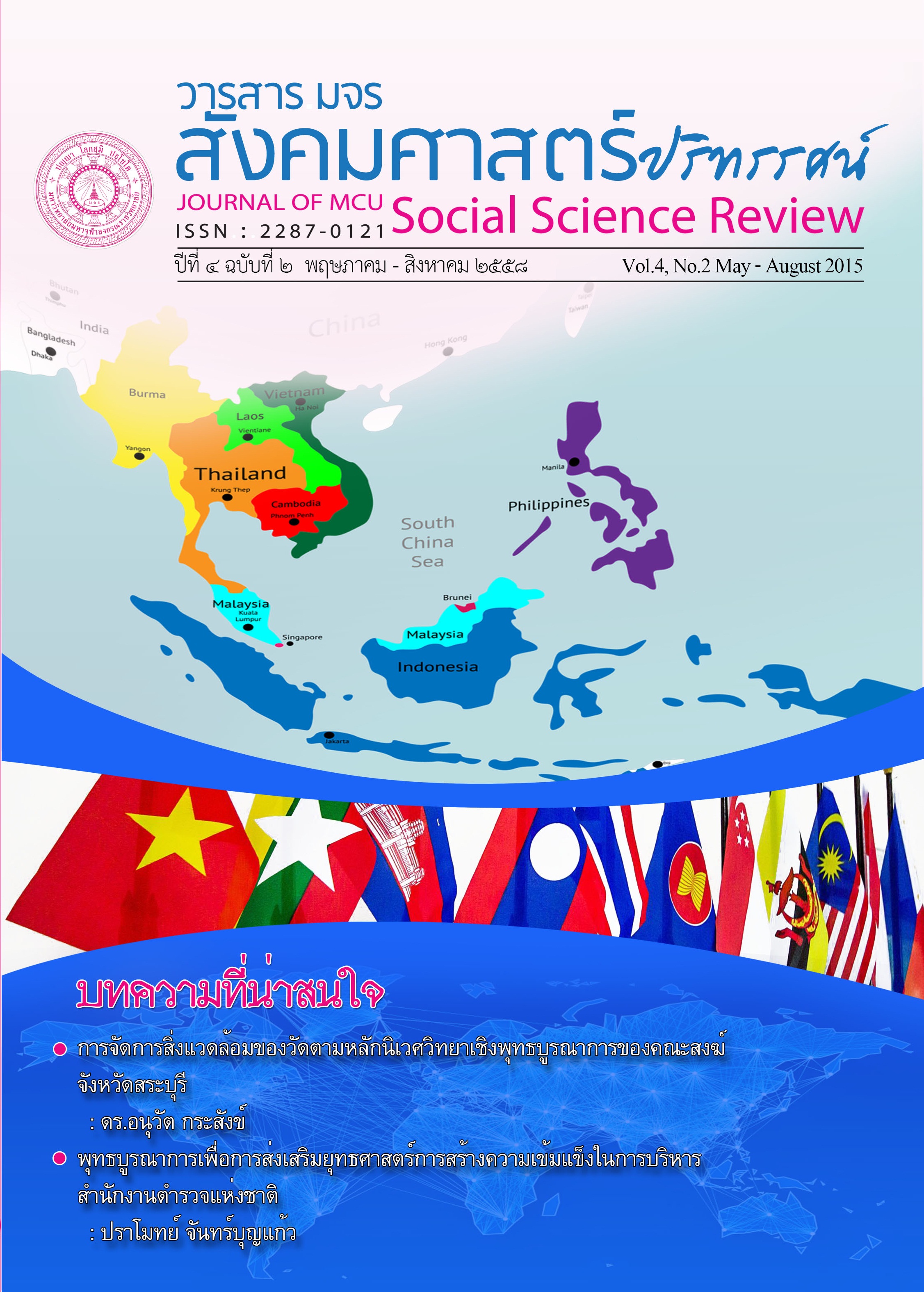รูปแบบการพัฒนาสมรรถนะพยาบาลเชิงพุทธบูรณาการของพยาบาล สังกัดกรมแพทย์ทหารเรือ
คำสำคัญ:
รูปแบบ, การพัฒนาสมรรถนะ, พุทธบูรณาการ, พยาบาลสังกัดกรมแพทย์ทหารเรือบทคัดย่อ
การวิจัยมีวัตถุประสงค์ ๓ ประการ ได้แก่ ๑) เพื่อศึกษาวิเคราะห์สภาพทั่วไปการพัฒนา สมรรถนะพยาบาลของพยาบาลสังกัดกรมแพทย์ทหารเรือ ๒) เพื่อศึกษาแนวคิด ทฤษฎีการพัฒนา สมรรถนะพยาบาล และหลักพุทธธรรมที่ส่งเสริมการพัฒนาสมรรถนะพยาบาลสังกัดกรมแพทย์ ทหารเรือและ ๓) เพื่อนําเสนอรูปแบบการพัฒนาสมรรถนะพยาบาลเชิงพุทธบูรณาการของพยาบาล สังกัดกรมแพทย์ทหารเรือ
ระเบียบวิธีการวิจัยแบบผสานวิธี (Mixed-Methods Research) ได้แก่ การวิจัยวิจัยเชิง คุณภาพ ได้แก่ การสัมภาษณ์เจาะลึกทั้งหมด ๒๕ รูป/คน วิเคราะห์ข้อมูลด้วยพรรณนาความ วิเคราะห์ และการวิจัยเชิงปริมาณโดยการแจกแบบสอบถามแก่พยาบาลสังกัดกรมแพทย์ทหารเรือ กลุ่มตัวอย่างจํานวน ๒๒๕ คนโดยใช้สถิติต่างๆ ดังนี้ ค่าร้อยละ ค่าเฉลี่ย และค่าส่วนเบี่ยงเบน มาตรฐาน
ผลการวิจัยพบว่า
๑) สภาพทั่วไปการพัฒนาสมรรถนะพยาบาล พบว่า ด้านจรรยาบรรณขาดเกณฑ์การ ประเมิน ตัวชี้วัด ขาดการเก็บข้อมูลพื้นฐาน และการปลูกฝังจริยธรรม จรรยาบรรณยังมีน้อย ด้าน คุณลักษณะเชิงวิชาชีพพยาบาลบางส่วนยังขาดความภาคภูมิใจในความเป็นอาชีพพยาบาล ขาตแผนการพัฒนาคุณลักษณะอย่างต่อเนื่อง และขาตการปรับตัวอย่างเหมาะสม ต้านการสื่อสาร
ขาดทักษะการสื่อสาร และขาดความรู้ด้านเทคโนโลยีสําหรับการสื่อสาร ภาษา และการให้ข้อมูล ความรู้เชิงวิชาชีพและด้านสัมพันธภาพขาดการเสริมแรง สร้างแรงจูงใจ ให้รางวัล ขาดกระบวนการ ส่งเสริมการเรียนรู้ตลอดเวลา และขาดการส่งเสริมความก้าวหน้าในวิชาชีพ
๒) แนวคิด และทฤษฎีการพัฒนาสมรรถนะที่นํามาใช้ในการกําหนดทิศทางสําหรับดึง และผลักพลังความรู้ พลังทักษะ พลังศักยภาพส่วนตัว พลังความสามารถ และพลังคุณลักษณะอื่น ๆ ของพยาบาลวิชาชีพออกมาใช้ในการปฏิบัติหน้าที่ให้มีประสิทธิภาพ และจะต้องขึ้นอยู่กับระบบการ พัฒนาอย่างถูกกระบวนวิธีการจนสามารถทําให้องค์กรมั่นใจและช่วยพัฒนาการเรียนรู้ของบุคลากร ซึ่งเมื่อนําอิทธิบาทธรรม ๔ ประการที่อยู่ในรูปของกระบวนวิธีการที่มีประสิทธิภาพก็ยิ่งทําให้ สมรรถนะพยาบาลสามารถปฏิบัติงานได้อย่างมีคุณภาพตามแนวทางพระพุทธศาสนามากยิ่งขึ้น คือ ทําให้พยาบาลมีความรักในอาชีพของตนเอง มีการปลูกพลังความเพียรในการปฏิบัติหน้าที่ มุ่งมั่น มั่นคงในอาชีพที่ตนเองได้เลือกที่จะดูแลผู้ป่วยอย่างไม่ท้อถอย และการใช้ความคิดในใคร่ครวญ การ คิดพินิจพิจารณาเพื่อการปรับปรุงการปฏิบัติงานให้มีประสิทธิภาพสูงสุด ซึ่งเมื่อนํามาบูรณาการจะ พบการเปลี่ยนที่สําคัญกล่าวคือ หลักอิทธิบาทจะเข้าไปช่วยให้การพัฒนาสมรรถนะของพยาบาล ประสบความสําเร็จตามที่องค์กรได้กําหนดไว้และผลักดันภารกิจอื่นๆ ให้บรรลุเป้าหมายอย่างมี ความสอดคล้องกันมากที่สุด
๓) รูปแบบการพัฒนาสมรรถนะของพยาบาล ต้านจรรยาบรรณที่ใช้กระบวนการตาม หลักอิทธิบาทธรรม พบว่า ต้านฉันทะ พบว่า มีความรักในอาชีพที่ต้องดูผู้ป่วยและรักผู้อื่น ด้วยการ กําหนดแผนการดูแลและการบํารุงขวัญกําลังใจพยาบาล ด้านวิริยะ พบว่า มีความเพียรปฏิบัติหน้าที่ เพื่อการดูแลผู้ป่วยและดูแลตนเองด้วยการจัดทีมในการให้คําปรึกษาแก่พยาบาล ด้านจิตตะ พบว่า การปลูกฝังอุดมการณ์ ด้วยการสอนงานด้วยหัวใจและมอบทักษะการดูแลตนเอง และด้านวิมังสา พบว่า ความรู้และการตัดสินใจเชิงจริยธรรม ด้วยการจัดระบบการเพิ่มความเชื่อมั่นของตนเองใน การปฏิบัติหน้าที่และจรรยาบรรณด้านคุณลักษณะเชิงวิชาชีพตามหลักอิทธิบาทธรรม พบว่า ด้าน ฉันทะ พบว่า การกระตุ้นอุดมการณ์ทางวิชาชีพ ด้านวิริยะ พบว่า กําหนดกระบวนการสร้าง แรงจูงใจด้วยความก้าวทางวิชาชีพด้านจิตตะ พบว่า การปลูกฝังเมตตา กรุณา และด้านวิมังสา พบว่า การส่งเสริมการมีส่วนร่วมต้านการสื่อสารตามหลักอิทธิบาทธรรม พบว่าต้านฉันทะ พบ การ สื่อสารด้วยหัวใจด้านวิริยะพบ การสื่อสารด้วยความรู้ใจด้านจิตตะ พบว่า การสื่อสารด้วยความมี เมตตากรุณาด้านวิมังสา พบ ความฉลาดในการสื่อสารกับผู้ป่วย และด้านสัมพันธภาพตามหลักอิทธิ บาทธรรม พบว่า ด้านฉันทะ พบ การส่งเสริมความเสมอภาคและความเคารพต่อผู้อื่นด้านวิริยะ พบ การใช้ความเพียรอย่างเหมาะสมในการสร้างสัมพันธภาพด้านจิตตะ พบว่า การปรับเจตคติที่ดีต่อ ผู้อื่น และด้านวิมังสา พบ การทํางานด้วยระบบทีมงานที่มีปัญญา
เอกสารอ้างอิง
(๑) หนังสือ
วีรยาภัทร อาชาชัย, หลักการวิจัยเบื้องต้น, พิมพ์ครั้งที่ ๓.กรุงเทพมหานคร: อินเตอร์เทคพริ้นติ้ง,๒๕๓๙
(๒) วารสาร
พระธรรมโกศาจารย์ (ประยูร ธมุมจิตโต), “ธรรมในใจของนักบริหารไฮโซ” ไทยรัฐ. (๒๐ มิถุนายน ๒๕๕๓) : ๒๔.
(๓) วิทยานิพนธ์/รายงานวิจัย
กัลยาณี คูณมี, “การบริหารผลงานและการจัดสรรสิ่งจูงใจต่อการพัฒนาระบบราชการและข้าราชการไทย” รายงานการวิจัย. คณะพัฒนาทรัพยากรมนุษย์สถาบันบัณฑิตพัฒนบริหารศาสตร์, ๒๕๕๒.
ฉัตรชาญ ทองจับ. “รูปแบบการพัฒนาสมรรถนะแรงงานในสถานประกอบการ”, วิทยานิพนธ์ครุศาสตรอุตสาหกรรมดุษฎีบัณฑิต. บัณฑิตวิทยาลัย : มหาวิทยาลัยเทคโนโลยีพระจอมเกล้าพระนครเหนือ, ๒๕๕๒
คาระกา ศิริสันติสัมฤทธิ์, “การศึกษารูปแบบสมรรถนะ บุคลากรสายงานสนับสนุนวิชาการ ในสถาบันอุดมศึกษาภาครัฐ” รายงานวิจัย. คณะครุศาสตร์อุตสาหกรรม : สถาบันเทคโนโลยีพระจอมเกล้าเจ้าคุณทหารลาดกระบัง.๒๕๕๒.
ทัศนีย์ เจนวิถีสุข. “การสื่อสารเชิงพุทธกับการเปลี่ยนแปลงสังคม” วิทยานิพนธ์พุทธศาสตรดุษฎีบัณฑิต. บัณฑิตวิทยาลัย: มหาวิทยาลัยมหาจุฬาลงกรณราชวิทยาลัย, ๒๕๕๕.
ปชาบดี แย้มสุนทร. “กลยุทธ์การสร้างความผูกพันต่อองค์กรตามหลักสังคหธรรมของแรงงงานอุตสาหกรรมอิเล็กทอรนิคส์” วิทยานิพนธ์พุทธศาสตรดุษฎีบัณฑิต สาขาวิชารัฐประศาสนศาสตร์), บัณฑิตวิทยาลัย มหาวิทยาลัยมหาจุฬาลงกรณราชวิทยาลัย, ๒๕๕๖.
พรชัยทองเจือ “การพัฒนารูปแบบความร่วมมือระหว่างสถาบันอุดมศึกษากับโรงเรียนในการเปลี่ยนผ่านด้านการเรียนการสอนในโรงเรียน”, วิทยานิพนธ์ครุศาสตรดุษฎีบัณฑิต. คณะครุศาสตร์ จุฬาลงกรณ์มหาวิทยาลัย, ๒๕๕๐.
พระมหาธฤติ วิโรจโน. “รูปแบบการพัฒนาพระสังฆาธิการเพื่อประสิทธิภาพการบริหารกิจการคณะสงฆ์” วิทยานิพนธ์พุทธศาสตรดุษฎีบัณฑิต. บัณฑิตวิทยาลัย: มหาวิทยาลัยมหาจุฬา ลงกรณราชวิทยาลัย, ๒๕๕๖.
พระมหาอํานาจ ปวฑฒโน “การพัฒนารูปแบบการจัดการศึกษาพระปริยัติธรรม”. วิทยานิพนธ์พุทธศาสตรดุษฎีบัณฑิต. บัณฑิตวิทยาลัย: มหาวิทยาลัยมหาจุฬาลงกรณราชวิทยาลัย,๒๕๕๖.
พิชญาภา ยืนยาว. “รูปแบบการบริหารทรัพยากรบุคคลในสถาบันอุดมศึกษา วิทยานิพนธ์ปรัชญาดุษฎีบัณฑิต. บัณฑิตวิทยาลัย : มหาวิทยาลัยศิลปกร, ๒๕๕๒
วีรชัย อนันต์เธียร “กลยุทธ์การพัฒนาจริยธรรมสําหรับเยาวชนไทย” วิทยานิพนธ์พุทธศาสตรดุษฎีบัณฑิต สาขาวิชารัฐประศาสนศาสตร์), บัณฑิตวิทยาลัย มหาวิทยาลัยมหาจุฬาลงกรณราชวิทยาลัย, ๒๕๕๖.สมพงษ์ จิตระดับและคณะ. “การพัฒนาสมรรถนะระบบที่ปรึกษาให้สภาเด็กและเยาวชนในประเทศไทย” รายงานการวิจัย. สํานักงานสวัสดิภาพและพิทักษ์เด็ก เยาวชน ผู้ด้อยโอกาสและผู้สูงอาย : กระทรวงการพัฒนาสังคมและความมั่นคงของมนุษย์. ๒๕๕๖.
อภิษฎาข์ ศรีเครือดง. “รูปแบบการพัฒนาภาวะผู้นําที่พึงประสงค์ตามแนวพุทธของผู้บริหารสตรีในมหาวิทยาลัยของรัฐ” วิทยานิพนธ์พุทธศาสตรดุษฎีบัณฑิต. บัณฑิตวิทยาลัย : มหาวิทยาลัยมหาจุฬาลงกรณ์มหาวิทยาลัย, ๒๕๕๖.
(๔) สื่ออิเล็กทรอนิกส์/เว็บไซต์:
มหาวิทยาลัยเทคโนโลยีราชมงคลพระนคร. แนวทางการพัฒนาระบบสมรรถนะเพื่อพัฒนาการ บริหารทรัพยากรบุคคล[ออนไลน์]. แหล่งข้อมูล : http://competency.rmutp.ac.th/. [๒๒ ตุลามคม ๒๕๕๗]
๒. ภาษาอังกฤษ
(1) Book
Evans, Richard l. The Making of Psychology: Discussions with Creative
Contributors. New York: Alfred A. Knopf. Goleman, 1976.
Daniel. Emotional Intelligence & Working with Emotional Intelligence. London:Bloomsbury Publishing. McClelland, 2004.
David C. Human Motivation. Cambridge: Cambridge University Press. McClelland,1987.
ดาวน์โหลด
เผยแพร่แล้ว
รูปแบบการอ้างอิง
ฉบับ
ประเภทบทความ
สัญญาอนุญาต
ลิขสิทธิ์ (c) 2018 วารสาร มจร สังคมศาสตร์ปริทรรศน์

อนุญาตภายใต้เงื่อนไข Creative Commons Attribution-NonCommercial-NoDerivatives 4.0 International License.
เพื่อให้เป็นไปตามกฎหมายลิขสิทธิ์ ผู้นิพนธ์ทุกท่านต้องลงลายมือชื่อในแบบฟอร์มใบมอบลิขสิทธิ์บทความให้แก่วารสารฯ พร้อมกับบทความต้นฉบับที่ได้แก้ไขครั้งสุดท้าย นอกจากนี้ ผู้นิพนธ์ทุกท่านต้องยืนยันว่าบทความต้นฉบับที่ส่งมาตีพิมพ์นั้น ได้ส่งมาตีพิมพ์เฉพาะในวารสาร มจร สังคมศาสตร์ปริทรรศน์ เพียงแห่งเดียวเท่านั้น หากมีการใช้ภาพหรือตารางหรือเนื้อหาอื่นๆ ของผู้นิพนธ์อื่นที่ปรากฏในสิ่งตีพิมพ์อื่นมาแล้ว ผู้นิพนธ์ต้องขออนุญาตเจ้าของลิขสิทธิ์ก่อน พร้อมทั้งแสดงหนังสือที่ได้รับการยินยอมต่อบรรณาธิการ ก่อนที่บทความจะได้รับการตีพิมพ์ หากไม่เป็นไปตามข้อกำหนดเบื้องต้น ทางวารสารจะถอดบทความของท่านออกโดยไม่มีข้อยกเว้นใดๆ ทั้งสิ้น





